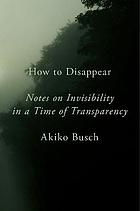
How to Disappear
Notes on Invisibility in a Time of Transparency
کتاب های مرتبط
- اطلاعات
- نقد و بررسی
- دیدگاه کاربران
نقد و بررسی

October 1, 2018
Essayist Busch (The Incidental Steward) meditates on how the human need for privacy and anonymity has reasserted itself with new urgency amid the exhibitionism of the technology-imbued modern world. With many seeking an “alternative to a life of perpetual display,” she offers a “field guide to invisibility,” with examples from science, literature, and visual art. The book draws from J.K. Rowling and Hans Christian Andersen to explore how children yearn for the ethereal, and shows how “erasure books,” like those of poet Mary Ruefle, create something new by obscuring the old. Astutely noting the significance of contemporary language like “ghosting” and “unseeing” things, Busch suggests absence can become a presence in its own right. Elsewhere, she visits Duke University’s engineering department to experiment with a real-life “cloaking device” and goes scuba diving to “become a refugee of the visible world.” Busch’s exploration of her subject is free-associative, wide-ranging, and poetic in its own right. Her description of visiting New York City’s Grand Central Terminal is particularly striking, as she is “swept along by the stream of humanity” amid the seemingly choreographed “gorgeous multitude.” Busch offers a path to quiet dignity that is rich and enlightening. Agent: Albert LaFarge, Albert LaFarge Literary Agency.

November 1, 2018
The joys of hiding from a cyberculture seeking to monitor your every move.Despite the subtitle, these are by no means "notes" but rather fully formed and often powerful explorations of the many realms and levels of invisibility to which one might aspire or withdraw. Busch (Design Research/School of Visual Arts; The Incidental Steward, 2013, etc.) starts in the woods, the narrative beginning like a meditation on going "off the grid." Yet she veers in less predictable directions, abandoning Alexa and the like for an inquiry into children's literature, the persistence of invisibility within it, and the value of having an imaginary friend--which, it turns out, may not be that different than the digital friendships adults cultivate. This analysis inevitably leads to social media and the persistent pressure to be noticed by others, to risk "Facebook depression, one result of this ceaseless exposure...the anxiety induced by social comparisons and the feeling of being less attractive or accomplished than other users." The author expounds on her suspicion that we're doing things wrong, overemphasizing visibility and self-promotion and undervaluing the opposite, and she surveys the invisible in nature, the arts, identity, and soul. It "is not the equivalent of being nonexistent," she writes, and subsequently elaborates, "it is nuanced, creative, sensitive, discerning." Busch examines how erasure has functioned in art, from "erasure books" that add to the texts by subtracting words, to the ability of the flamboyant David Bowie to appear invisible as a public persona while walking the streets of New York and the refusal of the popular, pseudonymous Italian novelist Elena Ferrante to use identity, biography, and personality to market her novels. Where the assertion of one's identity is concerned, Busch argues that less is more: "The measure of our humanity may be derived not from how we stand out in the world, but from the grace and concord with which we find our place in it."With a tone that is more evocative than provocative, Busch meaningfully celebrates value where it goes unseen by others.
COPYRIGHT(2018) Kirkus Reviews, ALL RIGHTS RESERVED.

February 1, 2019
In an age of social media and constant surveillance, Busch (faculty, Sch. of Visual Arts; Nine Ways To Cross a River) explores the many facets of invisibility in nature, science, and the arts. Her essays run the gamut from children's invisible friends to items in literature, such as rings and cloaks that make the wearer disappear, to the science of making objects appear invisible. The author also shares how plants such as the pebble plant blend into the landscape, how camouflage and countershading protect animal species, and how ocean divers are unperceived and ignored by ocean fauna. Artists paint human models to blend into various backgrounds and photograph them. Marginalized populations and women of a certain age seem to disappear to the rest of the world. The author explains how, in Iceland, spirit beings, the Huldufolk or Alfar, are real to many. Busch also investigates augmented reality; for example, artist Mark Skwarek digitally restored the natural landscape of the demilitarized zone between North and South Korea, deleting the military installations. VERDICT An impressive look at myriad, diverse examples of invisibility that will appeal to those interested in social sciences and the arts.--Sue O'Brien, Downers Grove, IL
Copyright 2019 Library Journal, LLC Used with permission.

February 15, 2019
Busch (The Incidental Steward, 2013) writes about nature and culture with delving curiosity and fresh thinking, offering here a unique engagement with the phenomenon and concept of invisibility. This supple and surprising inquiry was prompted by contemplation of the many modes of digital visibility, from social media and zillions of websites to the harvesting of pervasive forms of surveillance to the constant mining of personal data. What does all this exposure and our obsession with optics reveal about our sense of self and society? What might be gained by a reclamation of privacy and discretion? What might invisibility grant us? Busch investigates the divide between our visible and inner selves in this zestfully perceptive field guide to invisibility. She describes wondrous strategies for concealment in the natural world, considers the role of invisibility in myths and the arts, shares personal experiences, and notes various ways in which we are rendered invisible for better or worse. Ultimately, Busch elegantly advocates for elective invisibility as a way of acquiring a more humanitarian view of the larger world. Eye-opening and inspiring.(Reprinted with permission of Booklist, copyright 2019, American Library Association.)

























دیدگاه کاربران